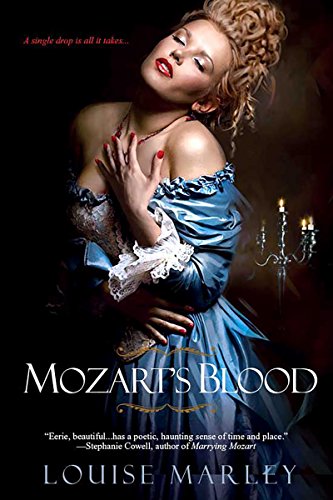
![]() Mozart’s Blood by Louise Marley
Mozart’s Blood by Louise Marley
Don’t judge a book by its cover, they say, and in the case of Mozart’s Blood by Louise Marley, that is very good advice indeed. One would expect a torrid romance novel from the painting of a woman with disproportionate breasts and a look of impending orgasm on her face. But one would be wrong. This vampire novel contains its fair share of passion, but it is more a character study than a romance. And while the structure of the novel is flawed, it is nonetheless a pleasant book with which to spend a few hours.
Octavia Voss is a mezzosoprano who is uncannily poised and talented. As the book opens, she is finishing a run of “La Traviata” at the Metropolitan Opera in New York, and is about to embark on the role of Donna Anna in Mozart’s “Don Giovanni” at the legendary La Scala in Milan, Italy. But no sooner do she and her assistant Ugo arrive than Ugo is kidnapped by a man calling himself Domenico, who is seeking information.
A story of high crime at the opera? In a sense, yes; but in this novel’s reality, much more. For Octavia is a vampire who has lived through several lives as an opera star. She began singing when she was known as Teresa Saporiti, appearing in the premiere performance of “Don Giovanni” at the age of nineteen. She is enraptured by Mozart — not just his music, but the man himself. She soon finds herself in bed with him, but unexpectedly also with the Countess Milosch, who, in the middle of the sex act, bites both her and Mozart. The changes come quickly after that, and Teresa must learn to make her way in the world as a vampire, with no guidance.
The one real benefit of becoming a vampire — aside from the minor detail of immortality — is that Teresa retains the memories of everyone with whom she “shares the tooth.” This means that she has all of Mozart’s memories, all his thoughts of harmony, rhythm, tone — she possesses his music in a way that no one else can. It is hardly a surprise, then, that she becomes a great opera star. But Teresa Saporiti cannot remain a young and beautiful opera star forever. As the century runs out, she must begin a new life as Helene Singher, and again, later, as Vivian Anderson, and yet again, as Octavia Voss.
Ugo has his own secret, and it, too, is tied to his voice. Ugo is a werewolf, even older than Octavia, with his own difficulties. He is ordered by the shadowy La Societa — a group of vampires older, seemingly, than time itself — to become Octavia’s assistant during her life as Helene. Primarily, he is instructed to control how Octavia feasts, and especially her regrettable habit of failing to kill her prey. He becomes her supplier, providing her with blood and making it unnecessary for her to kill. So when Ugo is kidnapped, Octavia loses her source of nourishment, and her thirst begins to grow.
Marley’s tale is full of information about Mozart, about opera, about the history of castrati, about music in general. It’s a new spin on vampirism, and that’s always welcome in a genre that threatens to go under from the weight of so many bloodsuckers. The real problem with this book is not in its characters or the plot, but in its episodic structure. The narrative jumps from century to century, persona to persona, and does so with two different characters (that is, both Octavia and Ugo). There is no order to the jumps, no sequence, so that the reader never knows what century she will be in when she turns the page. It becomes difficult to keep track of so many personas in so many time periods. As a result, the suspense is substantially diluted.
Still, the musical detail makes this book sing. Anyone familiar with “Don Giovanni” can hear how its bold, dark chords color the plot. It is worth reading Mozart’s Blood just for the opera scenes, a conclusion with which Marley’s vampires would likely agree.



I can’t resist this comment; that cover it hot…
Sorry, I know I’m a dog.
It is a hot cover, and thank you, Terry, for your opening paragraph, because I’ve walked past this book a few times now just for that reason–I assumed paranormal romance.
While I was in grad school at Indiana University (in the 90s), I learned to love opera. IU has one of the best music schools in the country and I made many friends who were grad students in the music school (singers, players, conductors, composers) while I was there. I have seen so many excellent performances and still keep up with my friends’ careers. I don’t think I know any vampires in opera, but it seems like a good culture for vampires. Next time I attend the opera, I will look carefully at the performers’ teeth.